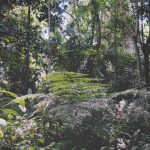Untitled
2013 - Sculpture (Sculpture)
13 1/8 x 10 3/8 x 3/4 in, 11 1/4 x 8 5/8 x 3/4 in, 12 5/8 x 9 1/2 x 1 1/4 in
Anna-Bella Papp
Untitled exemplifies the format that Anna Bella-Papp most commonly works in, using her hands to create delicate tablet-like reliefs within a rectangular form made out of clay. The lack of any glazes and other finishes used in traditionally in ceramics is a deliberate decision with an aim to preserve the pale hues and natural qualities of the clay. Papp’s decision to display the pieces resting flat on table tops, invites us to imagine them as landscapes or architectural structures seen from a bird’s-eye view. In this piece, the lines and stark formalism of the composition—the shape of a vertically oriented oval that has been cut out inside the rectangular tablet sitting beside a second oval-shaped incision that is deeper at one end—are reminiscent of Oscar Niemeyer’s modernist buildings or the amspaces built by Mies Van der rohe. In contrast to the monumental architecture it may suggest, the humble scale of Untitled (comparable to A4 paper size) demands a degree of proximity and intimacy with the viewer. Upon closer inspection it becomes clear: far from being models or maquettes, each permutation and trace of the artist’s hand is an object of beauty in itself.
Anna Bella-Papp recalls how intuitive it felt the first time she modelled something out of clay as a child. As something derived from the ground under us, clay always felt simple and familiar to her, and in part it’s that sense of immediacy that led her to work exclusively with unglazed and unfired clay. Papp’s hand-sculpted reliefs are modest in scale and consistently follow the format of a rectangle, which she then subtly modifies with unique incisions or marks, either building up or carving out parts of their surface. Working systematically within the same format allows for small changes and nuances to be imbued with meaning—each new mark becoming an experiment to gauge what range of expression can be wrought by such limited means. The result is a very palpable physicality evoked by simple and subtle forms. Working with and preserving the natural properties of clay is also important for Papp. Grey, white and ivory hues, and traces of fingerprints are left intentionally as clues that tell the story of where the material came from and how the object was made. Unlike stone, clay is constantly evolving—moving, contracting and changing color over time. Embracing this state of flux, Papp adjusts her body in relation to the clay as it changes, oscillating between making a mark and relinquishing control.
Colors:
Related works sharing similar palette
» see more

© » ARTS EQUATOR
Caring for the Carers: How Malaysian artists working with communities hold space | ArtsEquator Thinking and Talking about Arts and Culture in Southeast Asia ArtsEquator Viewpoints Courtesy of Syarifah Nadhirah August 12, 2021 By Rahmah Pauzi (1,300 words, 5-minute read) I had forgotten how loaded the words “how are you,” or “apa khabar,” can be...

© » KADIST
Prabhakar Pachpute
2020Calling attention to campaigns for land rights, survival, and sovereignty, Prabhakar Pachpute’s recent works consider how farmers in India use their bodies in performative ways during acts of protest...
Related works found in the same semantic group
» see more

© » KADIST
Chloé Quenum
2017The stained glass windows of Chloé Quenum’s Les Allégories evoke the sacred and describe the movement of a rooster in the form of patterns extracted from a wax fabric found in Benin...

© » KADIST
Benoît Maire
2006The piece consists of sculpture of 10 elements, among them: a globe, a picture of a gorilla, a chair, scrabble letters, 3 glasses of black ink, a book whose title is illuminated by the beam of a 8mm projector, a pair of boots, etc...




